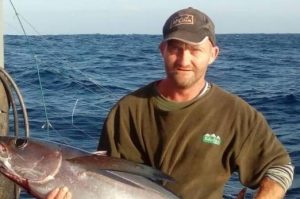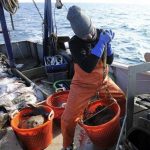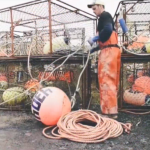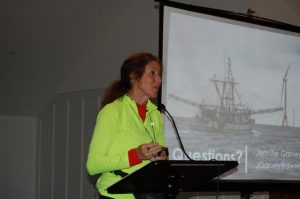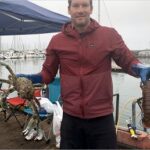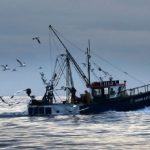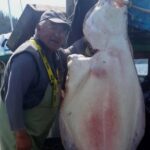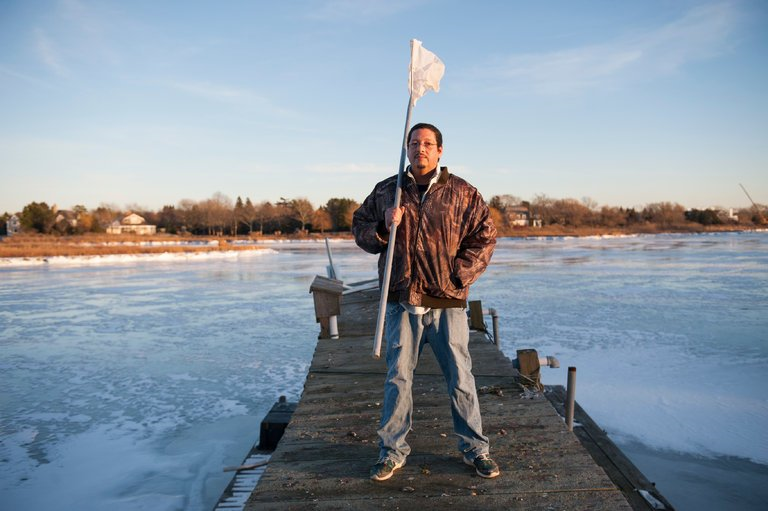Monthly Archives: January 2017

Fire extinguished on Renaissance Offshore LLC oil production platform in the Gulf, no sign of pollution
A fire broke out on an oil production platform in the Gulf of Mexico early Thursday (Jan. 5), forcing four workers to evacuate by lifeboat before the blaze was extinguished. There were no injuries and inspectors found no sign of pollution, authorities said. The blaze was reported about 2:30 a.m. on a platform about 80 miles south of Grand Isle, Louisiana, and was extinguished nearly four hours later, the Coast Guard said in a statement. The four workers were rescued by the crew of the 130-foot Mary Wyatt Milano, a supply vessel, the Coast Guard said. They were flown to a hospital in Houma to be evaluated, the Interior Department’s Bureau of Safety and Environmental Enforcement said in a statement. Read the story here 11:05
Craziest lobster contest winners announced in Yarmouth!
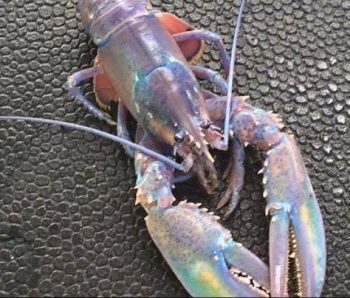 The Craziest Lobster Contest was run through the Murray GM Facebook Page during December. Lobster fishermen were asked to submit photos of their most unusual catches for a chance to win a $500 gift card. The winner was determined on Jan. 3 by the most likes. Marketing manager Billy Mole says he didn’t expect such a huge response. “The lobster submissions even got a bit overwhelming for me at times with them coming in all hours of the day and night,” he said. There were blue lobsters, spotted lobsters, bi-colour and more. That’s not even counting the bizarre specimens with extra appendages. The contest even pulled in submissions from Hawaii, Ecuador and a fish market in Tanzania. The winner was a rainbow-coloured lobster, which had close to 1,600 votes. Read the story here See more contestants here 10:41
The Craziest Lobster Contest was run through the Murray GM Facebook Page during December. Lobster fishermen were asked to submit photos of their most unusual catches for a chance to win a $500 gift card. The winner was determined on Jan. 3 by the most likes. Marketing manager Billy Mole says he didn’t expect such a huge response. “The lobster submissions even got a bit overwhelming for me at times with them coming in all hours of the day and night,” he said. There were blue lobsters, spotted lobsters, bi-colour and more. That’s not even counting the bizarre specimens with extra appendages. The contest even pulled in submissions from Hawaii, Ecuador and a fish market in Tanzania. The winner was a rainbow-coloured lobster, which had close to 1,600 votes. Read the story here See more contestants here 10:41
Indefinite ban on prawn imports after outbreak of white spot disease in Queensland
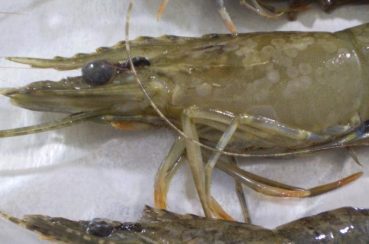 Deputy Prime Minister Barnaby Joyce has this morning bowed to pressure from prawn farmers and indefinitely banned importation of the frozen crustacean, following an outbreak of the devastating white spot disease in Queensland. Farmers have been lobbying for the suspension of Asian prawn imports following the discovery of the disease in five separate locations of the Logan River, south of Brisbane, last month. Mr Joyce said he was concerned the prawns infected prawns could make it into the waterways, further spreading the disease in Australian prawn farms. The biosecurity minister urged people who have bought raw green prawns not to put them in water ways, like using them as bait for fishing, with fears it could contaminate local prawns. Mr Joyce said a white spot disease outbreak could devastate Australia’s $360 million prawn industry. Read the story here 09:44
Deputy Prime Minister Barnaby Joyce has this morning bowed to pressure from prawn farmers and indefinitely banned importation of the frozen crustacean, following an outbreak of the devastating white spot disease in Queensland. Farmers have been lobbying for the suspension of Asian prawn imports following the discovery of the disease in five separate locations of the Logan River, south of Brisbane, last month. Mr Joyce said he was concerned the prawns infected prawns could make it into the waterways, further spreading the disease in Australian prawn farms. The biosecurity minister urged people who have bought raw green prawns not to put them in water ways, like using them as bait for fishing, with fears it could contaminate local prawns. Mr Joyce said a white spot disease outbreak could devastate Australia’s $360 million prawn industry. Read the story here 09:44
Congress Members Ask Commerce Secretary to Stop Summer Flounder Quota Cuts
 Congressman Frank Pallone, Jr. (NJ-06) and a bipartisan group from the New Jersey Congressional delegation sent a letter to U.S. Commerce Secretary Penny Pritzker asking her to prevent rulemaking that would reduce the summer flounder quotas for recreational and commercial fishing from going into effect. The letter asks the Secretary to direct NOAA Fisheries to reexamine its methodologies and conduct a new benchmark summer flounder assessment before making any decision to reduce summer flounder quotas. Under the rule, the summer flounder Acceptable Biological Catch (ABC) would be reduced 29% in 2017 and 16% in 2018. The recreational and commercial limits would both be reduced by approximately 30% in 2017 and 16% in 2018. Senators Robert Menendez and Cory Booker and Congressmen Frank LoBiondo (NJ-02) and Tom MacArthur (NJ-03), joined Pallone in the letter. Read the rest here 09:12
Congressman Frank Pallone, Jr. (NJ-06) and a bipartisan group from the New Jersey Congressional delegation sent a letter to U.S. Commerce Secretary Penny Pritzker asking her to prevent rulemaking that would reduce the summer flounder quotas for recreational and commercial fishing from going into effect. The letter asks the Secretary to direct NOAA Fisheries to reexamine its methodologies and conduct a new benchmark summer flounder assessment before making any decision to reduce summer flounder quotas. Under the rule, the summer flounder Acceptable Biological Catch (ABC) would be reduced 29% in 2017 and 16% in 2018. The recreational and commercial limits would both be reduced by approximately 30% in 2017 and 16% in 2018. Senators Robert Menendez and Cory Booker and Congressmen Frank LoBiondo (NJ-02) and Tom MacArthur (NJ-03), joined Pallone in the letter. Read the rest here 09:12
Virginia Delegate moves to roll back penalties for commercial fishing violations
 Virginia’s 18-month-old effort to crack down on oyster theft and other fisheries violations with stiffer penalties for offenders would be rolled back with a bill sponsored by Del. Gordon Helsel, R-Poquoson. Another measure would end a six-decade-old prohibition on taking oyster dredges through the sanctuaries the state set up to give undersized oysters a chance to grow. Helsel is proposing to cut the maximum penalty for violating state rules for harvesting shellfish and fin-fish to a two-year license suspension from the five-year limit the General Assembly unanimously approved in 2015. Helsel voted for the measure, which had strong backing from commercial fishermen. His bill, H.B. 1573, would also allow offenders to continue to catch other fish or shellfish than the type they took illegally — so, a waterman who violated rules about taking oysters from polluted waters or from a sanctuary would be allowed to continue crabbing or gill-netting. Legislation in 2013, which also passed unanimously, allowed the state to suspend all tidal water fishing privileges for offenders. Read the story here 07:48
Virginia’s 18-month-old effort to crack down on oyster theft and other fisheries violations with stiffer penalties for offenders would be rolled back with a bill sponsored by Del. Gordon Helsel, R-Poquoson. Another measure would end a six-decade-old prohibition on taking oyster dredges through the sanctuaries the state set up to give undersized oysters a chance to grow. Helsel is proposing to cut the maximum penalty for violating state rules for harvesting shellfish and fin-fish to a two-year license suspension from the five-year limit the General Assembly unanimously approved in 2015. Helsel voted for the measure, which had strong backing from commercial fishermen. His bill, H.B. 1573, would also allow offenders to continue to catch other fish or shellfish than the type they took illegally — so, a waterman who violated rules about taking oysters from polluted waters or from a sanctuary would be allowed to continue crabbing or gill-netting. Legislation in 2013, which also passed unanimously, allowed the state to suspend all tidal water fishing privileges for offenders. Read the story here 07:48

Wow! Council cracks up over catch shares
Everyone in the Gulf of Alaska agrees on one thing: it was the other side’s fault. Depending on who you ask, catch shares are evil incarnate or an angel of good management. Depending on who you ask, they’ll either save Kodiak or kill it. Depending on who you ask, it’s either the State of Alaska’s fault or its credit for not allowing catch shares in the Gulf of Alaska’s groundfish fishery. And depending on who you ask, they’ll either come up again or get sliced up into a handful of other little nibbles at the Gulf of Alaska bycatch problems. Either sighs of relief or defeat leaked from every mouth in the room on this past Dec. 12 when the North Pacific Fishery Management Council, which oversees all federal fisheries from three to 200 miles off the Alaska coast, indefinitely tabled a complex range of options for the Gulf of Alaska groundfish fisheries. Read the story here! 21:17
Thirty-six Washington Lawmakers back Columbia River salmon reforms
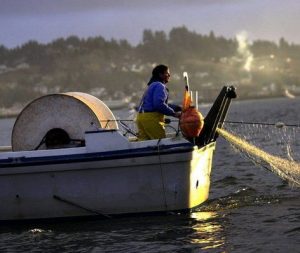 Thirty-six Washington lawmakers have signed on to a letter urging the state Fish and Wildlife Commission to push ahead in January with full implementation of the bistate Columbia River salmon reforms. Reforms adopted by Washington and Oregon in early 2013 allocated more chinook salmon to sportsmen in the main Columbia and restricted gillnetting to off-channel sites like Youngs Bay near Astoria. The reforms also called for commercial fishing that remained in the main Columbia to be done with live-capture methods — such as purse seines and beach seines — designed to harvest hatchery stocks and release wild fish.” Oregon is proposing to undo the plan based on a desire to significantly increase commercial gillnet fishing industry profits, rather than ensuring the viability of the commercial fishing industry as defined in the bistate agreement,’’ according to the letter. Read the story here 16:56
Thirty-six Washington lawmakers have signed on to a letter urging the state Fish and Wildlife Commission to push ahead in January with full implementation of the bistate Columbia River salmon reforms. Reforms adopted by Washington and Oregon in early 2013 allocated more chinook salmon to sportsmen in the main Columbia and restricted gillnetting to off-channel sites like Youngs Bay near Astoria. The reforms also called for commercial fishing that remained in the main Columbia to be done with live-capture methods — such as purse seines and beach seines — designed to harvest hatchery stocks and release wild fish.” Oregon is proposing to undo the plan based on a desire to significantly increase commercial gillnet fishing industry profits, rather than ensuring the viability of the commercial fishing industry as defined in the bistate agreement,’’ according to the letter. Read the story here 16:56
Quinault Indian Nation join West Coast crabbers on strike
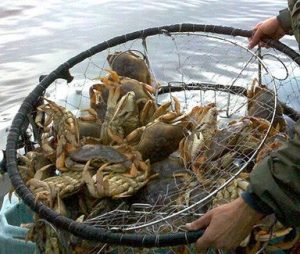 Fleets from Central California to the Canadian border are refusing to fish as the crabbing season opens along the coast. The strike is due to a price drop before Christmas, when Pacific Seafood began offering $2.75 per pound instead of $3. John Corbin, an Oregon fisherman and chairman of the Oregon Dungeness Crab Commission, said crabbing is expensive, especially with the substantial amount of bait that is used. “They’re getting us on both ends here,” Corbin said. “They’re charging us more for bait and they’re wanting to pay less for the crabs. So, it’s just cutting into the bottom line, and we just can’t do that.” On Wednesday, crabbing opened on Washington state’s coast, but no crabbing vessels set out. The Quinault Indian Nation has also joined commercial crabbers in the strike. Read the story here 16:02
Fleets from Central California to the Canadian border are refusing to fish as the crabbing season opens along the coast. The strike is due to a price drop before Christmas, when Pacific Seafood began offering $2.75 per pound instead of $3. John Corbin, an Oregon fisherman and chairman of the Oregon Dungeness Crab Commission, said crabbing is expensive, especially with the substantial amount of bait that is used. “They’re getting us on both ends here,” Corbin said. “They’re charging us more for bait and they’re wanting to pay less for the crabs. So, it’s just cutting into the bottom line, and we just can’t do that.” On Wednesday, crabbing opened on Washington state’s coast, but no crabbing vessels set out. The Quinault Indian Nation has also joined commercial crabbers in the strike. Read the story here 16:02
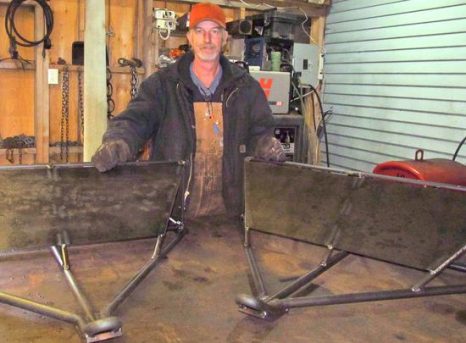
Island builder Kevin Grindle puts new take on scallop drags
The best place to find Kevin Grindle over the next few months is in his home workshop, where the inventor/builder is busy trying to fill orders from scallop fishers purchasing his newest project, a steel scallop drag. Grindle, who operates under the name Grindle Built, is a second generation shed junkie. His father, Herb Grindle, started building drags in the early 1970s, when the younger Grindle was just 10 years old. Looking up to his father, he soon learned the trades of building and welding. Several decades later, Grindle has found himself the maker of one of the hottest new fishing items around. “I have three in here right now, and that’s rare,” he said. “Usually I make them and I can’t keep them in here because the guys have already picked them up.” Read the article here 15:41
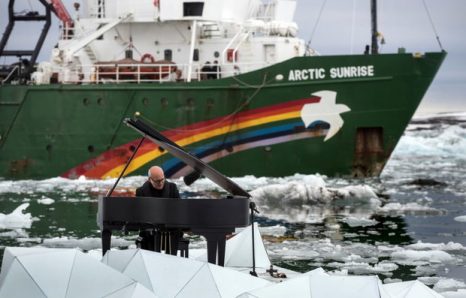
‘Big Green’ and environmental activists 2016’s biggest losers (Commentary)
The day after the presidential elections, Michael Brune, executive director of the Sierra Club, glumly called the Donald Trump victory “devastating for our climate and our future.” Well, yes, if you’re a climate-change alarmist who hates fossil fuels, you’re in for a bad four and maybe eight years. Greenpeace Executive Director Annie Leonard was even more apocalyptic, saying: “I never thought I’d have to write this. The election of Donald Trump as president has been devastating. … There’s no question, Donald Trump’s climate denial is staggering. He wants to shut down the EPA, ‘cancel’ the Paris Climate Agreement, stop funding clean energy research, and ‘drill, baby, drill.'” Ah, but if this is so crazy, why did he win? The short answer is that Americans went to the polls and rejected environmental extremism, among other things. The biggest loser on election night was America’s Big Green movement, dedicated to the anti-prosperity proposition that to save the planet from extinction we have de-industrialize the U.S. and throw millions and millions of our fellow citizens out of their jobs. Read the rest here 13:20:30
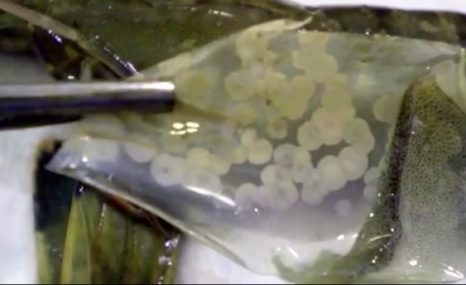
Australia: Fears grow as white spot detected in crab in Logan River
The devastating white spot disease threatening the Logan River prawn farming industry has now been detected in a crab. If retesting confirms the virus, it would be the first time the disease has transferred between species in Australia. Biosecurity Queensland tested the crab, which was found in a drainage channel near one of the infected prawn farms, this week and confirmed it initially tested positive for the virus that causes white spot. White spot, which can cause 100 per cent mortality within 10 days in farmed prawns, was first detected at a farm in Alberton, south of Brisbane, on November 22. The disease has spread to four other farms, forcing each farm to completely de-stock, a move estimated to cost the industry $25 million. Until the outbreak, Australia was considered free of white spot, which has spread throughout Asia and the Americas but does not pose a risk to humans. The detection in the crab was the first time the disease has appeared outside of a farm since six wild prawns were discovered with “low levels” of the disease on December 8. Read the story here 12:13
Nunavut court: case alleging illegal turbot fishing to go ahead
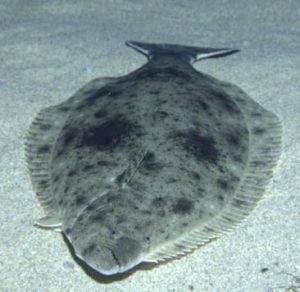 Despite the length of time their case has sat before the Nunavut court, a subsidiary of the Baffin Fisheries Coalition, along with the captain of one of the company’s fishing vessels, will still stand trial for fishing in illegal waters. That’s according to a written decision, released Dec. 12, from Justice Bonnie Tulloch of the Nunavut Court of Justice. The trial of Oujukoaq Fisheries Ltd. and its employee, David Dempsey, has twice been scheduled to proceed in an Iqaluit courtroom, most recently from Dec. 5 to Dec. 9, 2016. The co-accused face a single charge each under the Fisheries Act, dating to 2012, that alleges illegal turbot fishing in a prohibited area. But an application from defence lawyers to dismiss those charges due to unreasonable delays, filed in October 2016, cancelled the most recent trial date. Now, in her decision, Tulloch rejected that application and said the trial should be rescheduled as soon as possible. “It is a case with far-reaching implications for commercial fishermen in Canada. It is a case that deserves to be decided on its merit,” Tulloch said. Read the story here 11:39
Despite the length of time their case has sat before the Nunavut court, a subsidiary of the Baffin Fisheries Coalition, along with the captain of one of the company’s fishing vessels, will still stand trial for fishing in illegal waters. That’s according to a written decision, released Dec. 12, from Justice Bonnie Tulloch of the Nunavut Court of Justice. The trial of Oujukoaq Fisheries Ltd. and its employee, David Dempsey, has twice been scheduled to proceed in an Iqaluit courtroom, most recently from Dec. 5 to Dec. 9, 2016. The co-accused face a single charge each under the Fisheries Act, dating to 2012, that alleges illegal turbot fishing in a prohibited area. But an application from defence lawyers to dismiss those charges due to unreasonable delays, filed in October 2016, cancelled the most recent trial date. Now, in her decision, Tulloch rejected that application and said the trial should be rescheduled as soon as possible. “It is a case with far-reaching implications for commercial fishermen in Canada. It is a case that deserves to be decided on its merit,” Tulloch said. Read the story here 11:39
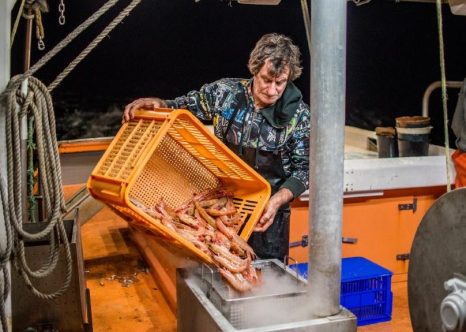
Importing seafood to Australia is like the governor of Alaska deciding to import ice – With Julian Tomlinson
Importing seafood to Australia must rank among the most jaw-droppingly gormless decisions ever made by someone claiming to have a fully functioning brain. It’s like the governor of Alaska deciding to import ice – but from a producer who uses water from a stagnant lake that is rapidly drying out. The south-east Queensland prawn farming industry is on the brink of disaster after white spot disease infected stock right before the lucrative Christmas period. Far Northern prawn farmers are rubbing their hands together and worrying at the same time. Loss of supply from the south-east should drive up demand for their product, but there are fears the disease was brought in from overseas imports and is spreading via birds. Australia has the world’s largest exclusive fishable area, waters of excellent quality, and among the most sustainable and high-quality seafood in the world. But the Aussie fishing industry has the lowest wild-harvest rate in the developed world and has been demonised and regulated so much that our supplies can’t meet domestic demand. Read the op-ed here If you’ve got time, a report also available (click here to read Australia’s Unappreciated and Maligned Fisheries. 09:40
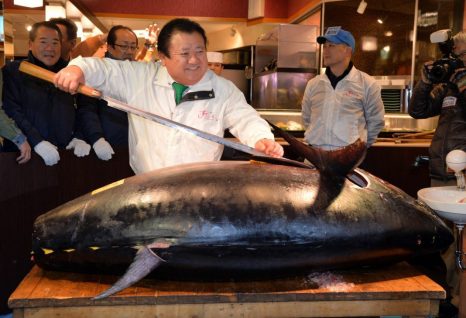
Bluefin tuna goes for $632000 in 1st Tsukiji auction of ’17
Kiyomura Co’s President Kiyoshi Kimura (C), who runs a chain of sushi restaurants Sushi Zanmai, poses with a 212 kg (467 lbs) bluefin tuna at his sushi restaurant outside Tsukiji fish market in Tokyo, Japan, January 5, 2017. Kimura won the bid for the tuna caught off Oma, Aomori prefecture, northern Japan, with a 74 million yen (633,000 USD) at the fish market’s first tuna auction this year. Kimura bought the most expensive tuna for the sixth consecutive year during the annual auction held in the Tsukiji Fish Market. The winning bid for the first tuna on the market past year was just 14 million yen. According to local sources, the ginormous blue tuna was sold to a major restaurant chain known as Sushi Zanmai. Read the rest here 08:15
Pacific Choice play for pocket change threatens to sink a second crab season – End crab strike: Pay the full $3
 North Coast commercial crabbers had a bad enough time last season, thanks to domoic acid spikes. But at least they could blame that on algae blooms and health concerns. This season could be undone by something entirely within human control: The unwillingness of seafood company Pacific Choice to shell out 25 cents more per pound for Dungeness crab meat. Crab prices have been set at $3 per pound since the November opening of the season; Pacific Choice wants to pay 25 cents less. The price dispute has put another crab season on hold. Local crab boats, if they stooped to selling crab for $2.75 per pound, would lose between $7,000 to $10,000 per average medium to small boat, according to the Humboldt Fishermen’s Marketing Association. Read the op-ed here 07:50
North Coast commercial crabbers had a bad enough time last season, thanks to domoic acid spikes. But at least they could blame that on algae blooms and health concerns. This season could be undone by something entirely within human control: The unwillingness of seafood company Pacific Choice to shell out 25 cents more per pound for Dungeness crab meat. Crab prices have been set at $3 per pound since the November opening of the season; Pacific Choice wants to pay 25 cents less. The price dispute has put another crab season on hold. Local crab boats, if they stooped to selling crab for $2.75 per pound, would lose between $7,000 to $10,000 per average medium to small boat, according to the Humboldt Fishermen’s Marketing Association. Read the op-ed here 07:50
BREAKING! Fire Burns on Oil Platform in Gulf of Mexico
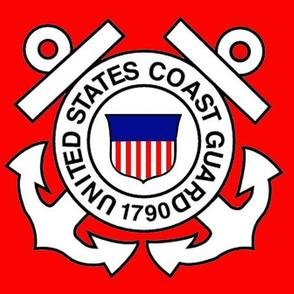 The Coast Guard says it’s responding to a fire on an oil platform in the Gulf of Mexico off the coast of Louisiana. A Coast Guard news release says the fire was reported around 2:30 a.m. Thursday on an oil platform about 80 miles south of Grand Isle, Louisiana. The Coast Guard says four people aboard the platform evacuated and were rescued by a supply vessel. No injuries have been reported. Four vessels are fighting the fire and the cause is under investigation. Updated click here 07:04
The Coast Guard says it’s responding to a fire on an oil platform in the Gulf of Mexico off the coast of Louisiana. A Coast Guard news release says the fire was reported around 2:30 a.m. Thursday on an oil platform about 80 miles south of Grand Isle, Louisiana. The Coast Guard says four people aboard the platform evacuated and were rescued by a supply vessel. No injuries have been reported. Four vessels are fighting the fire and the cause is under investigation. Updated click here 07:04

The New School in Kennebunk teaching commercial fishing course
By Shelley Wigglesworth – I have been privileged to help design and instruct a “public policy in the commercial fishing industry” course for high school students, along with teacher Steven Schaefer, at The New School, here in Kennebunk. When Schaefer first approached me about working with him, he wanted the students to hear from real people working in the industry and to learn from the men and women who know the ocean intimately, as only those who navigate it and rely on it to earn their living can. He wanted the students to learn about the side of fishing that you do not see in picturesque summer tourist photos in quaint harbors. Read the story here 16:50
The Surprising Side Effect of Anti-Anxiety Medication — on Salmon
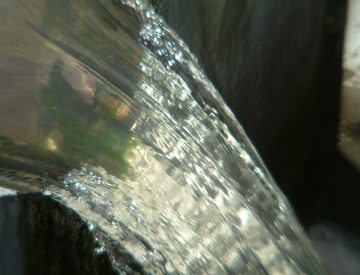 In a study out of Sweden’s Umeå University, researchers show oxazepam — a pharmaceutical prescribed to humans for the treatment of anxiety, alcohol withdrawal, and insomnia — affects the downstream migratory behaviour of Atlantic salmon. Exposing fish to anti-anxiety medication isn’t something that only happens in scientific studies: when humans excrete drugs, some can end up in wastewater effluent and subsequently in sensitive habitats where salmon may get an unintended dose. The researchers found that when fish ingest oxazepam, it makes them migrate faster and farther — potentially recklessly so. Leaving the freshwater nursery and heading out to sea is part of the salmon lifecycle, but landing in the big blue too soon can be risky. Fish may find ocean conditions unfavourable — too cold, too dangerous, or lacking food, for example. Read the story here 14:19
In a study out of Sweden’s Umeå University, researchers show oxazepam — a pharmaceutical prescribed to humans for the treatment of anxiety, alcohol withdrawal, and insomnia — affects the downstream migratory behaviour of Atlantic salmon. Exposing fish to anti-anxiety medication isn’t something that only happens in scientific studies: when humans excrete drugs, some can end up in wastewater effluent and subsequently in sensitive habitats where salmon may get an unintended dose. The researchers found that when fish ingest oxazepam, it makes them migrate faster and farther — potentially recklessly so. Leaving the freshwater nursery and heading out to sea is part of the salmon lifecycle, but landing in the big blue too soon can be risky. Fish may find ocean conditions unfavourable — too cold, too dangerous, or lacking food, for example. Read the story here 14:19
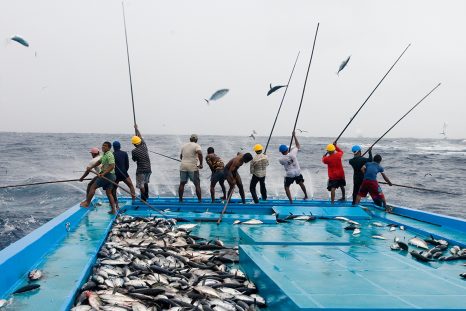
Ready for this one? Sustainable tuna fishing is bad for climate
What’s good for the ocean might be bad for the planet. Fishing boats that target specific species, leaving others free to swim away, use more fuel than vessels intent on simply scooping up all the fish in their vicinity. Eco-label initiatives and programmes like Monterey Bay Aquarium’s Seafood Watch, meant to help hungry diners quickly select sustainably caught seafood, have been gathering public support in recent years, says Brandi McKuin at the University of California Merced. While those guides are helpful, their standards focus mainly on fishing-based factors, like leaving enough fish in the ocean to avoid decimating the population, and reducing the number of accidently caught fish, or bycatch, McKuin says. Other impacts, including the greenhouse gas emissions generated by using different types of fishing gear, are often overlooked. “If we’re including climate change in the sustainability criteria, it changes things,” McKuin says. Read the story here 13:31
Dongwon Industries catches bluefin tuna for first time in waters off Iceland
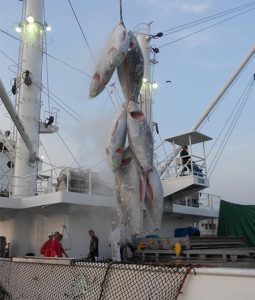 Dongwon Industries Co., South Korea’s largest fishing company, said Tuesday it netted up tuna from high-latitude North Atlantic Ocean, a deep-sea area nearly monopolized by Japanese fishers well experienced against tumultuous sea climate and freezing waters. The company said it will put the first catches at its retail restaurants this month. The top-tier bluefin features thick fat and firm texture built to protect body temperature from cold exposure. The North Atlantic species represent only 0.4 percent of bluefin tuna caught around the world. Because of this rarity, a 400kg bluefin tuna caught in the sea sells at about 12 million won ($10,000) in the international market. The tuna fishing company has operated mostly in southern Pacific Ocean. The company said its advance into the high-latitude North Atlantic Ocean required 16 months of preparation. Ships were modified to shield against the waves and to allow better drainage. In addition, a veteran fishing foreman was recruited from Japan. The company sailed two fishing vessels to fish tuna throughout October in the waters off Iceland. The tuna caught weighs over 200kg on average and the heaviest one weighs nearly 300kg, the company said. Link 12:47
Dongwon Industries Co., South Korea’s largest fishing company, said Tuesday it netted up tuna from high-latitude North Atlantic Ocean, a deep-sea area nearly monopolized by Japanese fishers well experienced against tumultuous sea climate and freezing waters. The company said it will put the first catches at its retail restaurants this month. The top-tier bluefin features thick fat and firm texture built to protect body temperature from cold exposure. The North Atlantic species represent only 0.4 percent of bluefin tuna caught around the world. Because of this rarity, a 400kg bluefin tuna caught in the sea sells at about 12 million won ($10,000) in the international market. The tuna fishing company has operated mostly in southern Pacific Ocean. The company said its advance into the high-latitude North Atlantic Ocean required 16 months of preparation. Ships were modified to shield against the waves and to allow better drainage. In addition, a veteran fishing foreman was recruited from Japan. The company sailed two fishing vessels to fish tuna throughout October in the waters off Iceland. The tuna caught weighs over 200kg on average and the heaviest one weighs nearly 300kg, the company said. Link 12:47
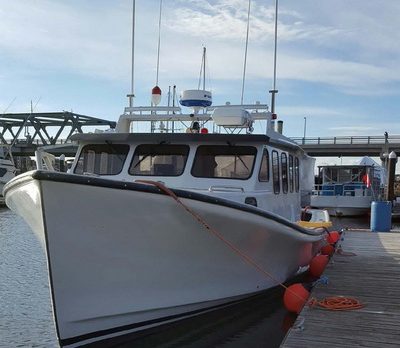
Athearn Marine Agency Boat of the Week: 2013 45′ Hutt Bros. Lobster boat, 6 Cylinder Lugger Diesel- Exceptional condition
Specifications, information and 26 photo’s click here To see all the boats in this series, Click here 11:50
Strike Update – Crab fishermen stand strong, hold out for Pacific Seafoods pre-negotiated price
 Commercial crab fishermen continue to strike along the West Coast, hoping processors will pay the $3 opening price that was negotiated prior to the season opening. Instead, wholesale buyers and processors have not budged on the $2.75 per pound they are now offering. The $3 per pound price was negotiated prior to the Brookings and Port Orford crab opening on Dec. 18. The price was lowered on Dec. 26, just eight days after that partial opening of the fishery. In response, crab fishermen from Morro Bay, Calif., to the Canadian border have tied up their boats. One local processor is Bandon Pacific in Charleston, a division of Pacific Seafood, which owns and operates more than 38 processing and distribution facilities from Alaska to Texas, with many of them on the West coast in coastal communities throughout the Pacific region. John Corbin, president of the Oregon Dungeness Crab Commission, and a fisherman who lives in Seaside and fishes the Columbia River, said there has been “really no change” since fishermen decided to strike. Corbin said fishermen all along the coast in different ports have been meeting daily via phone conference, but processors have not met with them. Read the story here 10:51
Commercial crab fishermen continue to strike along the West Coast, hoping processors will pay the $3 opening price that was negotiated prior to the season opening. Instead, wholesale buyers and processors have not budged on the $2.75 per pound they are now offering. The $3 per pound price was negotiated prior to the Brookings and Port Orford crab opening on Dec. 18. The price was lowered on Dec. 26, just eight days after that partial opening of the fishery. In response, crab fishermen from Morro Bay, Calif., to the Canadian border have tied up their boats. One local processor is Bandon Pacific in Charleston, a division of Pacific Seafood, which owns and operates more than 38 processing and distribution facilities from Alaska to Texas, with many of them on the West coast in coastal communities throughout the Pacific region. John Corbin, president of the Oregon Dungeness Crab Commission, and a fisherman who lives in Seaside and fishes the Columbia River, said there has been “really no change” since fishermen decided to strike. Corbin said fishermen all along the coast in different ports have been meeting daily via phone conference, but processors have not met with them. Read the story here 10:51
‘I was driving in lobster,’ Beaches strewn with ‘millions’ of lobsters after storm surge along New Brunswick’s northeast coast
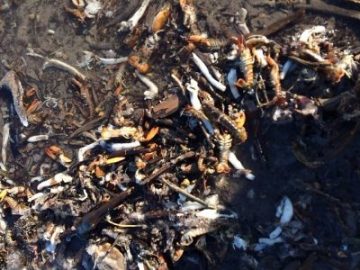 Jean Benoit says he never expected to see what he described as ‘millions’ of lobsters washed up on the beach in Val Comeau, N.B., on Saturday morning. “I was driving in lobster,” he said of his trip to the beach about 10 kilometres from Tracadie-Sheila on the Acadian Peninsula. Benoit and his friends routinely check the beach after storms but weren’t prepared for what they found New Year’s Eve, after Environment Canada warned of a storm surge the day before. “It was incredible all the lobster that we can get there,” Benoit said. “It was amazing. We cannot imagine what the wind can bring us, but it was too much.” He described seeing lobster, crabs and big clams washed up in stretches of 150 metres, then nothing for a stretch of 300 metres, then more shellfish again. Read the story here 09:37
Jean Benoit says he never expected to see what he described as ‘millions’ of lobsters washed up on the beach in Val Comeau, N.B., on Saturday morning. “I was driving in lobster,” he said of his trip to the beach about 10 kilometres from Tracadie-Sheila on the Acadian Peninsula. Benoit and his friends routinely check the beach after storms but weren’t prepared for what they found New Year’s Eve, after Environment Canada warned of a storm surge the day before. “It was incredible all the lobster that we can get there,” Benoit said. “It was amazing. We cannot imagine what the wind can bring us, but it was too much.” He described seeing lobster, crabs and big clams washed up in stretches of 150 metres, then nothing for a stretch of 300 metres, then more shellfish again. Read the story here 09:37
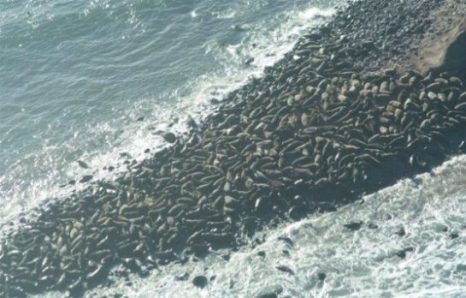
Quebec rejects proposed cull of Brion Island grey seals, to dismay of local biologist
A biologist from the Magdalen Islands is angry the Quebec government has rejected a plan to slaughter 1,200 grey seals on Brion Island, a nature reserve in the archipelago, for scientific research. The grey seal population in the area has ballooned from 400 in 1999 to 10,000 today. The proposal from Dr. Pierre-Yves Daoust, a wildlife veterinarian and pathologist at UPEI’s Atlantic Veterinary College at UPEI, hinged on getting the approval of Quebec’s fisheries and environment ministries. It was rejected last month. Biologist Sébastien Cyr said the proposed cull had the unanimous support of people in the Magdalen Islands. “All the fishermen’s associations had supported the project, the environmental groups as well, the municipality’s residents … There was a consensus in the community for the project,” Cyr said. Read the story here 09:02
Participants in cooperative winter sampling program for Gulf of Maine northern shrimp announced
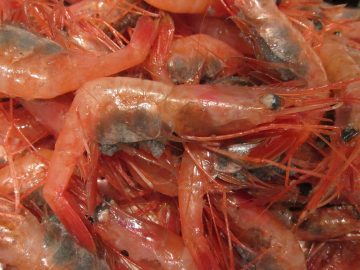 The program, coordinated by the Maine Department of Marine Resources, New Hampshire Fish and Game Department, and Massachusetts Division of Marine Fisheries, is designed to provide biological data on the shrimp fishery which is closed for the fourth year in a row. These Maine fishermen were chosen from over 60 applicants based on a random drawing of those fully qualified in each region. Preference was given to trawlers willing to participate in a test of a compound grate for harvesting. The sampling program will include the participation of 10 trawlers (eight Maine trawlers, one Massachusetts trawler and one New Hampshire trawler) and five Maine trappers fishing for eight weeks from mid-January to mid-March. Read the story here 08:15
The program, coordinated by the Maine Department of Marine Resources, New Hampshire Fish and Game Department, and Massachusetts Division of Marine Fisheries, is designed to provide biological data on the shrimp fishery which is closed for the fourth year in a row. These Maine fishermen were chosen from over 60 applicants based on a random drawing of those fully qualified in each region. Preference was given to trawlers willing to participate in a test of a compound grate for harvesting. The sampling program will include the participation of 10 trawlers (eight Maine trawlers, one Massachusetts trawler and one New Hampshire trawler) and five Maine trappers fishing for eight weeks from mid-January to mid-March. Read the story here 08:15
California court case could disrupt WDFW Wild Future Initiative
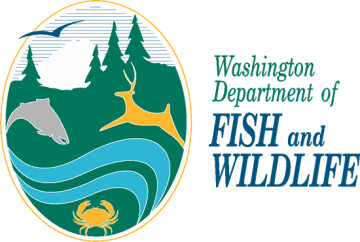 A decision made in a California court case may change the trajectory of a Washington Department of Fish and Wildlife initiative that would raise fees for resident commercial fishers and lower the fees for non-residents. Last December the U.S. 9th District Court of Appeals determined that California’s nonresident fee differential for numerous commercial fishing permits, licenses and vessel registration was constitutional. A group of out of state fishers challenged California differentiating between resident and non-resident fishers under the Privileges and Immunities Clause and the Equal Protection Clause of the U.S. Constitution. So what does the decision mean in Washington State? Well, the California lawsuit was the premise for the WDFW Wild Future initiative, which would essentially not differentiate fees for resident and non-resident commercial fishers, something the WDFW has called “equalizing the fees.” Read the article here 20:47
A decision made in a California court case may change the trajectory of a Washington Department of Fish and Wildlife initiative that would raise fees for resident commercial fishers and lower the fees for non-residents. Last December the U.S. 9th District Court of Appeals determined that California’s nonresident fee differential for numerous commercial fishing permits, licenses and vessel registration was constitutional. A group of out of state fishers challenged California differentiating between resident and non-resident fishers under the Privileges and Immunities Clause and the Equal Protection Clause of the U.S. Constitution. So what does the decision mean in Washington State? Well, the California lawsuit was the premise for the WDFW Wild Future initiative, which would essentially not differentiate fees for resident and non-resident commercial fishers, something the WDFW has called “equalizing the fees.” Read the article here 20:47
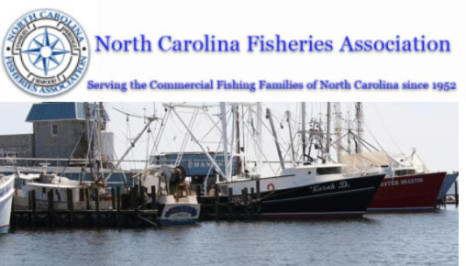
North Carolina Fisheries Association Weekly Update for January 2, 2017
Click here to read the Weekly Update, to read all the updates, Click here 18:42
Department of Energy Pulls the Funding Plug from Fishermen’s Energy Wind Project
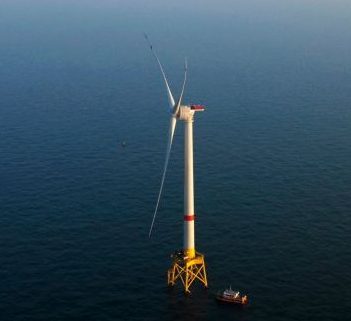 The U.S. Department of Energy says Fishermen’s Energy failed to meet a Dec. 31 deadline to have a power purchase agreement in place. The department is revoking most of the $47 million in funding it pledged to the project in 2014; about $10.6 million has been spent already on preliminary work. In a written statement to The Associated Press on Tuesday, the energy department said the Atlantic City project missed a key deadline. “Under the Energy Department’s award, Fishermen’s Energy must have secured a power offtake agreement by December 31 to be eligible for another round of funding,” the department said. “The criteria were not met by that date, so we have initiated the close-out process for the project.” Company CEO Chris Wissemann said Fishermen’s Energy hopes a last-ditch effort to secure a power deal will succeed. Read the story here 17:59
The U.S. Department of Energy says Fishermen’s Energy failed to meet a Dec. 31 deadline to have a power purchase agreement in place. The department is revoking most of the $47 million in funding it pledged to the project in 2014; about $10.6 million has been spent already on preliminary work. In a written statement to The Associated Press on Tuesday, the energy department said the Atlantic City project missed a key deadline. “Under the Energy Department’s award, Fishermen’s Energy must have secured a power offtake agreement by December 31 to be eligible for another round of funding,” the department said. “The criteria were not met by that date, so we have initiated the close-out process for the project.” Company CEO Chris Wissemann said Fishermen’s Energy hopes a last-ditch effort to secure a power deal will succeed. Read the story here 17:59
Most southwest Nova Scotia beaches now clear of dead herring, latest round of tests find no viruses
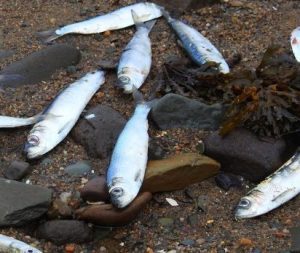 Fisheries officials say the flood of dead herring washing up on southwest Nova Scotia beaches has slowed. Fisheries and Oceans Canada says it is monitoring for “evidence of new incidents” in areas where thousands of dead herring have been found since November, and more recently scores of starfish, clams and lobster. Read the story here Meanwhile, The latest round of tests from fish kills in southwest Nova Scotia have not found any viruses. “The viral tests, the long-term ones we were waiting for, all of them came back negative,” said David Jennings, a spokesman for the Department of Fisheries and Oceans in Halifax. Jennings said recent patrols confirm most beaches from Tusket in Yarmouth County around to inner St. Marys Bay are clear of dead herring. The majority of those that remain on shore are located from the mouth of the Sissiboo River to the Plympton area, he said. “We have a few new wash-ups of herring being identified, but not to the extent reported [on] earlier.” Read the story here 17:28
Fisheries officials say the flood of dead herring washing up on southwest Nova Scotia beaches has slowed. Fisheries and Oceans Canada says it is monitoring for “evidence of new incidents” in areas where thousands of dead herring have been found since November, and more recently scores of starfish, clams and lobster. Read the story here Meanwhile, The latest round of tests from fish kills in southwest Nova Scotia have not found any viruses. “The viral tests, the long-term ones we were waiting for, all of them came back negative,” said David Jennings, a spokesman for the Department of Fisheries and Oceans in Halifax. Jennings said recent patrols confirm most beaches from Tusket in Yarmouth County around to inner St. Marys Bay are clear of dead herring. The majority of those that remain on shore are located from the mouth of the Sissiboo River to the Plympton area, he said. “We have a few new wash-ups of herring being identified, but not to the extent reported [on] earlier.” Read the story here 17:28
Video: Crew catches 16-foot “monster” great white shark off Hilton Head Island
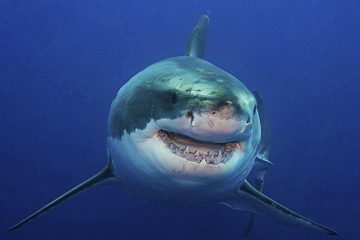 Chip Michalove has been obsessed with sharks since he was 5 years old. So, it’s no surprise he grew up to become a charter fisherman. For the past 17 years, Michalove, the owner and captain of Outcast Sport Fishing on Hilton Head Island, South Carolina, has helped tag hundreds of sharks — mainly tiger sharks. But he hoped to one day fulfill his lifelong dream: to catch a great white in the Atlantic Ocean. On New Year’s Eve, Michalove’s dream came true in a big way. The fisherman hooked a 16-foot female great white shark. Video, read the story here 16:02
Chip Michalove has been obsessed with sharks since he was 5 years old. So, it’s no surprise he grew up to become a charter fisherman. For the past 17 years, Michalove, the owner and captain of Outcast Sport Fishing on Hilton Head Island, South Carolina, has helped tag hundreds of sharks — mainly tiger sharks. But he hoped to one day fulfill his lifelong dream: to catch a great white in the Atlantic Ocean. On New Year’s Eve, Michalove’s dream came true in a big way. The fisherman hooked a 16-foot female great white shark. Video, read the story here 16:02

































